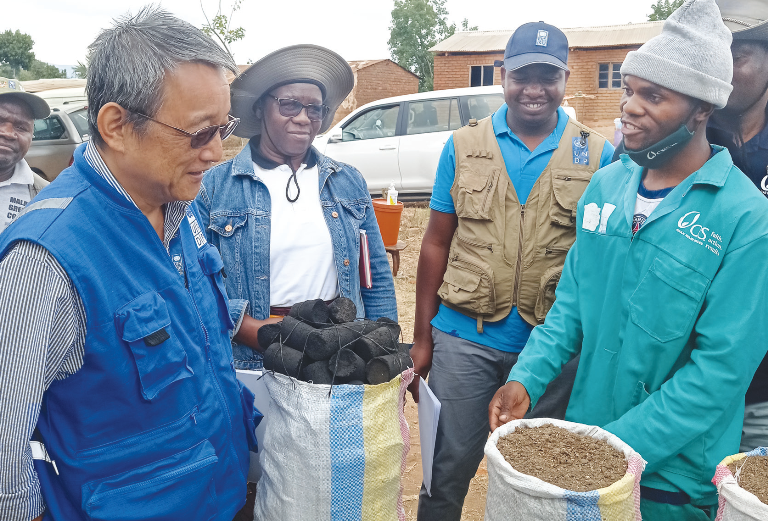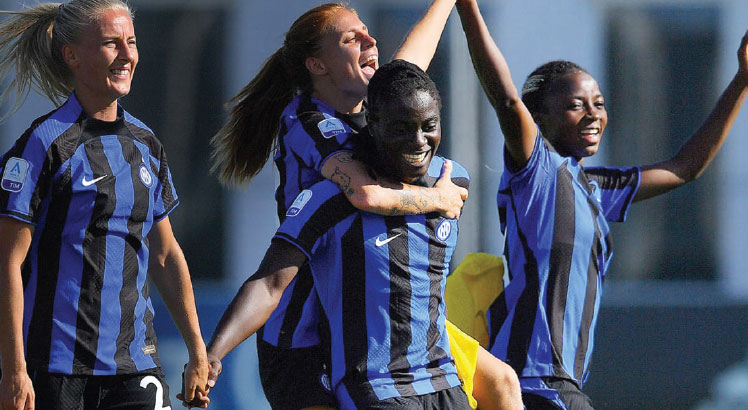In Malawi, one cannot pass cities, towns, districts and markets without bumping into heaps of waste.
The widespread breakdown in waste management has attracted several interventions from both government and non-governmental organisations, but with little success.
Kamatsubara inspects briquettes by Tigonjetse Youth Club
However, the indiscriminate dumping of waste has not discouraged some concerned players from exploring sustainable waste management strategies.
Two years ago, the United Nations Development Programme (UNDP) rolled out the Malawi Green Corps (MGC) project in 10 districts.
The initiative ending in December this year targets 2 000 young people in forestry and waste management in Lilongwe, Salima, Dedza and Ntcheu in the Central Region. Other target districts include Blantyre, Zomba, Mangochi and Machinga in the South as well as Mzimba and Karonga in the Northern Region.
“People just throw waste anyhow, so we take and reuse it as raw materials for making doormats, chandeliers and tumblers,” explains Luis Patel of Mangochi.
Patel’s youth group collects waste from illegal dumpsites, including a mound in the vicinity of Mangochi District Council Hall.
They reuse some waste materials and sell others, especially sacks, paper and bottles.
The group members trained by the project share the skills with their peers free of charge.
Patel is optimistic to sustain the project beyond the December deadline.
Nellia Kabango’s Tigonjetse Youth Club in Traditional Authority Kwataine in Ntcheu makes briquettes from groundnuts pods and straws.
Locals in the rural community say cooking using the briquettes has the potential to reduce wanton felling of trees for firewood and charcoal.
“Ntcheu has been hard done by the loss of trees,” says Kabango, the group’s chairperson. “For the club, nothing is sweeter than taking initiatives to reduce the appetite for fuelwood. We want households to switch to briquettes.”
UNDP is implementing the initiative in partnership with government.
The youth groups collect waste materials to produce usable products.
“Apart from briquettes, we also make organic fertiliser, which is cheaper than chemical fertiliser,” says Kabango.
The waste-related initiatives are also lessening youth unemployment.
“Before, some young people were indulging in risky behaviours, including drug abuse, alcoholism and transactional sex because we had nothing worthwhile to do,” she says.
In Salima, the project has motivated the youth to conserve the environment. They also make briquettes from wastepaper.
Salima Link for Sustainable Development chairperson Noel Hopusi advises the youth to work hard to cash in from the efforts making Malawi clean.
“We have benefited a lot from the knowledge Samantha Ludik has given us as regards converting waste into usable products,” he says.
Ludik, an environmentalist based in Senga Bay in Salima, trains the youth to reduce, reuse and recycle waste.
She hails the project for providing the youth with in-depth knowledge on the importance of sustainable waste management.
However, Ludik stresses the need to link the youth groups with experts to help them churn out quality products.
“The youth are taught to use glass or plastic bottles for building instead of using burnt bricks, which propel forests degradation.
The project is currently in its second four-month cohort. During this period, Catholic Relief Services (CRS), one of the MGC partners, trains them in usable skills to benefit beyond the project cycle.
CRS works with some of the youth to rehabilitate degraded forests in their communities.
“While involved in waste management, the youth in Mangochi also make jam using the business skills acquired from the project,” says CRS country director Sekai Mudonhi.
The project was designed to create green jobs for the youth and ease the country’s high unemployment rate.
CRS plans to scale up the initiative by roping in other organisations that recycle waste profitably to assist the youth produce quality items.
UNDP resident representative Shigeki Komatsubara is happy that the MGC Project unites the youth to learn from each other, especially how they can produce better products.
He says the groups create an opportunity for young people to create business models that will make a difference for them.
The project targets the youth aged 18 to 35. The selected groups get training in forestry, waste management, landscape restoration and green entrepreneurship.
During the contract, each person receives a stipend of K900 per day and K7 500 at the end of the deal.
The post Nothing goes to waste appeared first on The Nation Online.
 Moni Malawi
Moni Malawi 

